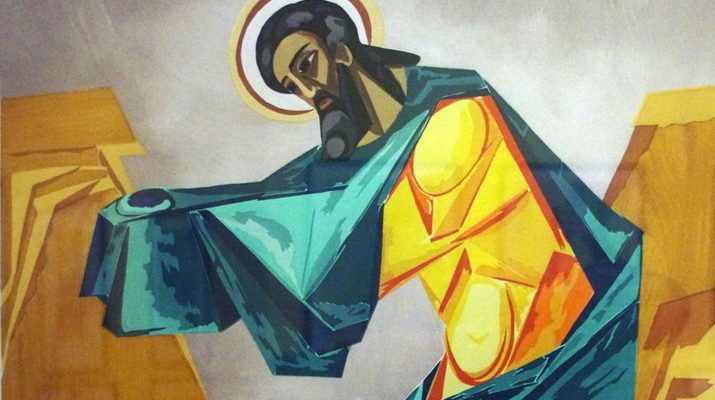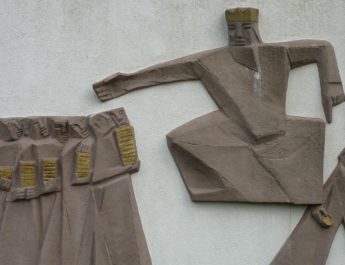Acts 4:5-12
Eastertide B22
5 AThe next day their rulers,B elders,C and scribesD assembledE in Jerusalem,F
A {untranslated} = ginomai. This is to come into being, to happen, become, be born. It can be to emerge from one state or condition to another or is coming into being with the sense of movement or growth.
B “rulers” = archon. From archo (to rule, begin, have first rank or have political power). This is ruler, leader, magistrate, official, prince, chief.
C “elders” = presbuteros. From presbus (old man). This is an elder as one of the Sanhedrin and also in the Christian assembly in the early church.
D “scribes” = grammateus. From gramma (what is drawn or written so a letter of the alphabet, correspondence, literature, learning); from grapho (to write). This is a writer, scribe, or secretary. Within Judaism, it was someone learned in the Law, a teacher. Also used in the Bible of the town-clerk of Ephesus. See Sirach 38:24-39:11 for a lengthier, positive passage about who scribes were and what they meant in society.
E “assembled” = sunago. From sun (with, together with, closely associated) + ago (to lead, bring, carry, guide, go, drive). This is to lead together and so to assemble, bring together, welcome with hospitality, or entertain. In the sense of assembly, this is the root of the word “synagogue.”
F “Jerusalem” = Ierousalem. From Hebrew yerushalaim (probably foundation of peace); {from yarah (to throw, shoot, be stunned; to flow as water so figuratively to instruct or teach) + shalem (to make amends, to be complete or sound)}. This is Jerusalem, dwelling of peace.
6 with AnnasG the high priest,H Caiaphas,I
G “Annas” = Hannas. 4x in NT. From Hebrew chananyah (Hannaniah; “the Lord has been gracious” or “the Lord has favored); {from chanan (beseech, show favor, be gracious; properly, to bend in kindness to someone with less status) Yah (the shortened form of the name of the God of Israel; God, Lord); {from YHVH (proper name of the God of Israel; God, Lord; the self-existent or eternal one); from havah (to become) or hayah (to be, become, happen)}}. This is Annas, meaning “the Lord has been gracious.”
H “high priest” = archiereus. Related to “rulers” in v5. From archo (see note B above) + hiereus (a priest literal or figurative – of any faith); {from hieros (sacred, something sacred, temple, holy, set apart; something consecrated to God or a god)} This is a high or chief priest.
I “Caiaphas” = Kaiaphas. 9x in NT. From Aramaic (as beautiful) OR from kefa (rock, stone) OR from Akkadian kaypha (dell, depression). This is Caiaphas. See https://en.wikipedia.org/wiki/Caiaphas
JohnJ and Alexander,K and all who were of the high-priestlyL family.M
J “John” = Ioannes. Related to “Annas” in v6. From Hebrew yochanan (Johanan); from Yehochanan (“the Lord has been gracious”); {from YHVH (see note G above) + chanan (see note G above). This is John, meaning “the Lord has been gracious.”
K “Alexander” = Alexandros. 6x in NT. From alexo (to ward off) + aner (man, male, sir, husband). This is Alexander, meaning “man-defender.”
L “high-priestly” = archieratikos. Related to “rulers” in v5 & “high priest” in v6. 1x in NT. From archiereus (see note H above). This is related to the high priest.
M “family” = genos. Related to {untranslated} in v5. From ginomai (see note A above). This is family, offspring, kin – in a literal or figurative sense.
7 When they had made the prisoners standN in their midst, they inquired,O “By what powerP or by what nameQ did you doR this?”
N “made…stand” = histemi. This is to stand, place, establish, appoint, stand ready, be steadfast.
O “inquired” = punthanomai. 12x in NT. This is to ask in order to learn. It is not to ask a favor (erotao in Greek), to demand something felt to be owed (aiteo), to search for a hidden thing (zeteo), or to ask for urgent help (deomai). This is to figure something out through questions.
P “power” = dunamis. From dunamai (to be able, have power or ability). This is might, strength, physical power, efficacy, energy, and miraculous power. It is force literally or figuratively – the power of a miracle or the miracle itself.
Q “name” = onoma. May be from ginosko (know, recognize, learn from firsthand experience). This is a name, authority, cause, character, fame, reputation. The name was thought to include something of the essence of the person so it was not thought to be separate from the person.
R “do” = poieo. This is to make, do, act, construct, abide, or cause.
8 Then Peter,S filledT with the HolyU Spirit,V said to them, “Rulers of the peopleW and elders,
S “Peter” = Petros. Related to petra (large rock that is connected and or projecting like a rock, ledge, or cliff; can also be cave or stony ground). This is Peter, a stone, pebble, or boulder.
T “filled” = pleitho. This is to fill to the highest level possible – to accomplish, supply, or complete.
U “Holy” = hagios. From hagnos (holy, sacred, pure ethically, ritually, or ceremonially; prepared for worship, chaste, unadulterated, pure to the core; undefiled by sin; figurative for innocent, modest, perfect). God is totally different from humanity and thus set apart. That which is consecrated to worship God (elements of worship) or to serve God (as the saints) are holy because they are now set apart for God’s purposes. Holy because important to God. This is sacred physically, pure. It can be morally blameless or ceremonially consecrated.
V “Spirit” = Pneuma. From pneo (to blow, breath, breathe hard). This is wind, breath, or ghost. A breeze or a blast or air, a breath. Figuratively used for a spirit, the human soul or part of us that is rational. It is also used supernaturally for angels, demons, God, and the Holy Spirit. This is where pneumonia comes from.
W “people” = laos. This is the people or crowd – often used for the chosen people. This is where the word “laity” comes from.
9 if we are questionedX today because of a good deedY done to someoneZ who was sickAA and are asked how this man has been healed,BB
X “questioned” = anakrino. 16x in NT. From ana (up, again, back, among, anew) + krino (to judge, decide, think good, condemn, determine, pass judgment, stand trial, sue; judging whether in court or in a private setting; properly, mentally separating or distinguishing an issue – to come to a choice or decision, to judge positively or negatively in seeking what is right or wrong, who is innocent or guilty; can imply trying, condemning, punishing, or avenging). 16x in NT. This is to scrutinize, examine, investigate, judge, or discern. Properly, it refers to very thorough investigation or careful study. It was used to talk about investigating crimes in the ancient world. It can also be used to talk about interrogation that uses torture.
Y “good deed” = euergesia. 2x in NT. From euergetes (someone who does good, benefactor, philanthropist); {from eu (good, well, well done, rightly) + the same as ergon (word, task, action, employment); {from ergo (to work, accomplish) or from erdo (to do)}}. This is a good deed, benefit, service.
Z “someone” = anthropos. Perhaps related to “Alexander” in v6. Probably from aner (see note K above) + ops (eye, face). This is human, humankind. Used for all genders.
AA “sick” = asthenes. From a (not) + sthenes (strong, vigor); {from the base of sthenoo (to strengthen so that one can be mobile); from sthenos (strength)}. This is without strength so weak, sick, helpless, frail, feeble. It can also be unimpressive or impotent. It can be used for physical or moral weakness.
BB “healed” = sozo. From sos (safe, rescued, well). This is to save, heal, preserve, or rescue. Properly, this is taking someone from danger to safety. It can be delivering or protecting literally or figuratively. This is the root that “savior” and “salvation” come from in Greek.
10 let it be knownCC to all of you, and to all the people of Israel,DD that this man is standingEE beforeFF you in good healthGG
CC “known” = gnostos. Related to “name” in v7. 15x in NT. From ginosko (see note Q above). This is known, notable, or an acquaintance.
DD “Israel” = Israel. From Hebrew Yisrael (God strives or one who strives with God; new name for Jacob and for his offspring); {from sarah (to persist, exert oneself, contend, persevere, wrestle, prevail) + el (God or god)}. This is Israel the people and the land.
EE “standing” = paristemi. Related to “made…stand” in v7 & “crucified” in v10. From para (from beside, by) + histemi (see note N above). This is literally to place by stand. It can mean to present, exhibit, appear, bring, stand by, or prove. It can also mean to be ready, to assist, to yield, or to commend.
FF “before” = enopion. Related to “someone” in v9. From en (in, on, at, by with) + ops (see note Z above). This is literally “in the eye of” and is used for before or in the presence of.
GG “in good health” = hugies. 12x in NT. Perhaps from auksano (to grow or enlarge, whether literal or figurative). This is healthy, whole, pure, normal, restored, wholesome. Figuratively, it can mean a sound or true teaching. It is where “hygiene” comes from.
by the name of JesusHH ChristII of Nazareth,JJ
HH “Jesus” = Iesous. Related to “Annas” and “John” in v6. From Hebrew Yehoshua (Joshua, the Lord is salvation); {from YHVH (see note G above) + yasha (to deliver, defend, help, preserve, rescue; properly, to be open, wide or free, which implies being safe. So, in a causative sense, this is to free someone)}. This is Jesus or Joshua in Greek – the Lord saves or the Lord is salvation.
II “Christ” = Christos. From chrio (consecrate by anointing with oil; often done for prophets, priests, or kings). Literally, the anointed one, Christ. The Greek word for Messiah.
JJ “Nazareth” = Nazoraios. 13x in NT. Probably from nazara (Nazareth); perhaps from netser (branch) OR from natsar (to watch, guard, protect). This is Nazarene. See https://en.wikipedia.org/wiki/Nazareth
whom you crucified,KK whom GodLL raisedMM from the dead.NN
KK “crucified” = stauroo. Related to “made…stand” in v7. .From stauros (upright stake, cross; literally the horizontal beam of a Roman cross, generally carried by the one convicted to die); from the same as histemi (see note N above). This can be to attach someone to a cross or fencing with stakes. In a figurative sense, it could be to destroy, mortify, or subdue passions/selfishness.
LL “God” = Theos. From Proto-Indo-European origins, meaning do, put, place. This is God or a god in general.
MM “raised” = egeiro. This is to awake, raise up or lift up. It can be to get up from sitting or lying down, to get up from sleeping, to rise from a disease or from death. Figuratively, it can be rising from inactivity or from ruins.
NN “dead” = nekros. Perhaps from nekus (corpse). This is dead of lifeless, mortal, corpse. It can also be used figuratively for powerless or ineffective. It is where the word “necrotic” comes from.
11 This Jesus is
‘the stone that was rejectedOO by you, the builders;PP
it has becomeQQ the cornerstone.’RR
OO “rejected” = exoutheneo. 11x in NT. From ek (from, from out of) + oudeis (no one, none, nothing; ruling out absolutely); {from oude (and not, neither, not even) {from ou (not, no) + de (but, and, now, indeed)} + heis (one, first, alone)}. Properly, this is casting someone or something out as nothing, consider someone or something nothing – of no account. This would be to treat someone with utter contempt or to ignore them.
PP “builders” = oikodomeo. From oikos (house – the building, the household, the family, descendants; the temple) + domeo (to build). This is to build a house or be a house builder. Figuratively, it can mean to edify or encourage, be strong or embolden.
QQ “become” = ginomai. Same as {untranslated} in v5. See note A above.
RR “cornerstone” = kephale + gonia. Kephale is head or chief. It can be a literal head or, figuratively, a ruler or lord. It can also refer to a corner stone. This is where the word “cephalic” comes from. Gonia is 9x in NT. From gonu (knee, foot). This is an angle or corner. It can also refer to somewhere that is hidden.
12 There is salvationSS in no one else,TT for there is no otherUU name under heavenVV
SS “salvation” = soteria. Related to “healed” in v9. From soter (a savior, deliverer); from sozo (see note BB above). This is deliverance, salvation, preservation, welfare, prosperity, safety.
TT “else” = allos. This is other, another. Specifically, it is another of a similar kind or type. There is a different word in Greek that speaks of another as a different kind (heteros).
UU “other” = heteros. This is other, another, different, strange. It is another of a different kind in contrast to the Greek word allos, which is another of the same kind. This could be a different quality, type, or group.
VV “heaven” = ouranos. May be related to oros (mountain, hill) with the notion of height. This is the air, the sky, the atmosphere, and heaven. It is the sky that is visible and the spiritual heaven where God dwells. Heaven implies happiness, power, and eternity.
given among mortalsWW by which we mustXX be saved.”YY
WW “mortals” = anthropos. Same as “someone” in v9. See note Z above.
XX “must” = dei. From deo (to tie, bind, compel; declare unlawful). This is what is necessary or proper. It is what is needed or what one should do – a duty or something inevitable. This refers to something absolutely necessary.
YY “saved” = sozo. Same as “healed” in v9. See note BB above.
Image credit: “St. Peter” this is “Costume design for St. Peter for the ballet ‘Liturgy'” by Natalii︠a︡ Sergeevna Goncharova, 1915.




